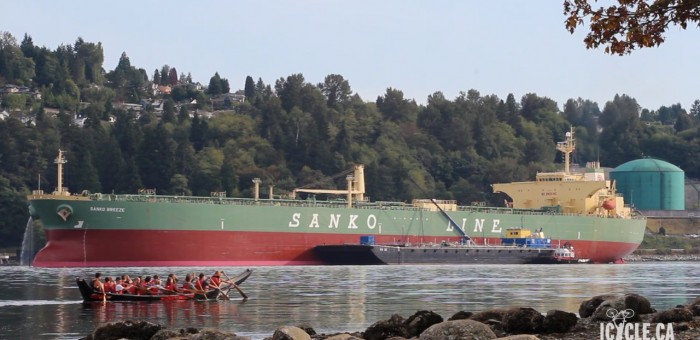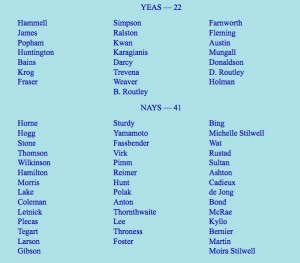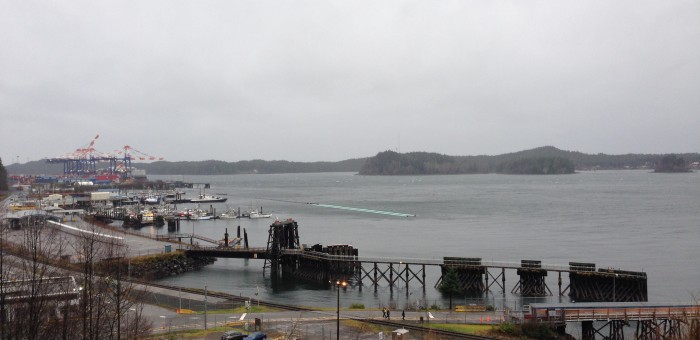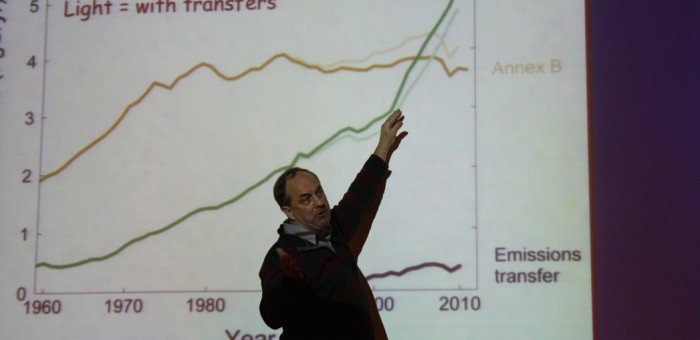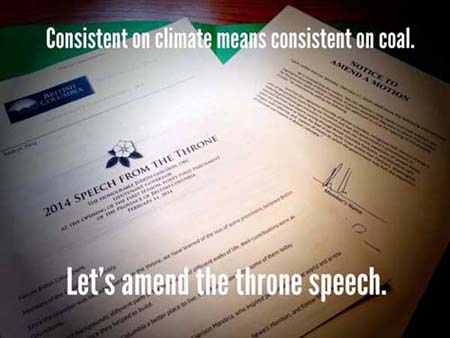Search results for: Coal
Trying to Protect the BC coast from expansion of thermal coal & diluted bitumen exports
During the committee stage of Bill 12, The Federal Port Development Act on Thursday afternoon, I put forth a number of amendments in an attempt to protect the British Columbia coast from the expansion of thermal coal and heavy oil (diluted bitumen) exports. These were the amendments mentioned in my earlier post on Bill 12. All amendments were defeated. Below I provide a brief excerpt from Hansard.
First Amendment
A. Weaver: With respect to the minister, the reason I have troubles with this legislation is…. We are not debating the Canada Marine Act. I will come to that.
Under the Canada Marine Act, the federal government can sell federal land in a port to a port authority, which could be administered by the province of British Columbia. In selling the land to the port authority, the Species at Risk Act and the Canadian Environmental Assessment Act no longer have any jurisdiction because the land is no longer owned by the federal government. It is now within the port authority, administered by the province of British Columbia.
My concern, therefore, with respect to an undertaking is that heavy oil or thermal coal experts would then no longer have to worry about Species at Risk or Canadian Environmental Assessment Act implications in any development there. The problem with that is that we don’t have anything in the province of British Columbia as a Species at Risk Act.
In essence, what’s happening in accepting an agreement like this, through an undertaking involving either coal or heavy oil, as we will discuss in section 3, is we are essentially saying that we in British Columbia can exempt such development from the federal Species at Risk Act and we have nothing to fall upon here in British Columbia. We can fall on the Environmental Assessment Act.
Frankly, with respect to what we’ve seen with Kinder Morgan and Enbridge, the province has done an admirable job in terms of representing the interests of British Columbia. I have not seen that with respect to thermal coal, and for this reason I do have two amendments I would like to bring here to specifically exclude from ‘undertaking’.
[To amend as follows:
By adding the text shown as underlined:
Section 1
“undertaking” means an undertaking, or an undertaking in a class, designated for the purposes of section 64.1(2)(a) of the Canada Marine Act; excluding an undertaking, or an undertaking in a class, relating to the import or export of thermal coal.]
That is the first amendment I so move.
The Chair: The amendment was proposed by the member for Oak Bay–Gordon Head. It reads: “‘undertaking’ means an undertaking, or an undertaking in a class, designated for the purposes of section 64.1 (2)(a) of the Canada Marine Act, excluding an undertaking, or an undertaking in a class, relating to the import or export of thermal coal.”
Amendment negatived on the following division:
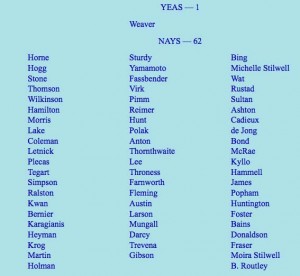
The Chair: Hon. Members, stay in your seats. The member is going to move another amendment.
Second Amendment
A. Weaver: As I mentioned earlier, I have a legal backgrounder from West Coast Environmental Law, which talks about the passage of Canada Marine Act, which we’re talking with respect to the “undertaking” definition here.
That would significantly increase the powers of port authorities, allow the federal government to off-load its responsibility over shipping in federal ports, etc. The changes now allow port authorities to buy federal land and infrastructure from the government and then lease those lands to companies or authorize companies to use them for as long as the port authority has control over them.
Once sold, those lands would no longer be federal property, meaning they would not be subject to terrestrial species protection under the Species at Risk Act.
Seeing as we have no species at risk act here in British Columbia, this raises some concern, which is why I move, again, an amendment to amend as follows:
[By adding the text shown as underlined:
Section 1
“undertaking” means an undertaking, or an undertaking in a class, designated for the purposes of section 64.1 (2)(a) of the Canada Marine Act excluding an undertaking or an undertaking in a class relating to the import or export of heavy oil.]
In light of the fact that we do not import heavy oil that probably is moot, but certainly export is a big issue that’s facing us now.
The Chair: Hon. Members, if the House waives the time we will proceed right away. Do we have consent?
Leave granted.
Amendment negatived on the following division: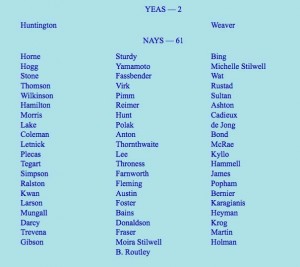
Third Amendment
A. Weaver: Thank you to the minister for the answer. My concern here is that the province would enter an agreement and potentially get into a position where the Species at Risk Act is not applicable or in force. I have an amendment here I’d like to move, which is to amend section 2 as follows:
[By adding the text shown as underlined:
Section 2
With the prior approval of the Lieutenant Governor in Council, a member of the Executive Council may enter into an agreement on behalf of the government.
If
(a) the province has first enacted provincial legislation comparable in power and scope to the Species at Risk Act (S.C. 2002, c. 29), and
(b) any and all port developments subject to the agreement that would have previously triggered a review under the Species at Risk Act (S.C. 2002, c. 29) prior to the royal assent of Bill C-43 (2014), automatically trigger a review under the legislation referenced in subsection (a).]
On the amendment.
A. Weaver: This is a piece of legislation trying to ensure that British Columbia enforces species-at-risk legislation. If it doesn’t enforce the federal one — which it can’t, of course — it has to produce its own if it’s going to enter an agreement as per the discussion here.
The Chair: Hon. Members, it’s an amendment moved by the member for Oak Bay–Gordon Head regarding the Species at Risk Act.
Amendment negatived on the following division:
A new poll on expanding coal exports through British Columbia ports
Thank you to everyone who participated in our first polling question using PoliSourceBC. The final results of the poll are listed below. Our next poll touches on an issue that I have written extensively about on this site (type coal into the search bar above for a list of articles).
“Burning thermal coal to produce electricity is the world’s biggest single source of greenhouse gas emissions. Washington, Oregon and California States are taking steps to halt the expansion of thermal coal exports through their ports. Do you believe that BC should take similar steps to halt the expansion of thermal coal exports through its ports?”
To participate in this poll please click here.
RESULTS OF PREVIOUS POLL
“Do you support the Green Party of BC policy to add a 6th condition for the approval of resource development applications? Condition #6 would be: No diluted bitumen in tanks on BC coastal waters.”
The poll ran from March 4 to March 24, 2014 and there were 273 responses as follows:
- Yes – 237 (87%)
- No – 27 (10%)
- Other – 9 (3%)
Approximately 20% of the responses were from constituents, according to postal code data.
What Leadership Looks Like on Thermal Coal Exports
By 2016, B.C. will have doubled its thermal coal exports. Thermal coal is largely sourced from outside of British Columbia and contributes very little to B.C. jobs. It is also one of the single largest contributors to global carbon emissions. In fact, the increase in B.C.’s thermal coal exports that we will see in the next two years alone will produce more carbon emissions than our entire province will in 2020, assuming we meet our legislated climate targets.
Last fall, the BC government joined the Pacific Coast Action Plan on Climate and Energy. Together with Washington, Oregon, and California, we committed to building a strategic alignment to combat climate change and promote clean energy. Our partners understand the threat of thermal coal and have taken practical steps to reduce their thermal coal exports. It’s time B.C. did the same.
State Leadership on a National Issue
Recognizing that they have limited power within their jurisdiction the leaders of California, Oregon and Washington are putting pressure on the American federal government to halt the expansion of coal exports. For instance, the Governors of Oregon and Washington have pressured the Obama administration to review the impact that leasing and exporting western coal has on climate change. A letter signed by both governors states: “We cannot seriously take the position in international and national policymaking that we are a leader in controlling greenhouse gas emissions without also examining how we will use and price the world’s largest proven coal reserves.” Furthermore the governors believe that “the decisions to continue and expand coal leasing from federal lands and authorize the export of that coal are likely to lead to long-term investments in coal generation in Asia, with air quality and climate impacts in the United States that dwarf those of almost any other action the federal government could take in the foreseeable future”.
Similarly, in 2012, the Assembly and Senate of the State of California passed a resolution urging the American President and Congress to “enact legislation to restrict the transshipment for waterborne export of coal for electricity generation to any nation that fails to adopt rules and regulations on the emissions of greenhouse gases”. This resolution easily passed in California.
Practical Steps that Make a Difference
Meanwhile, these states are also taking practical steps within their jurisdiction to halt the expansion of coal exports. For example, a few weeks ago the Port of Oakland board of commissioners in California unanimously rejected two proposals that would have seen the construction of a new coal export facility, citing environmental concerns, public health hazards, economic pitfalls, and public opposition. This is the most recent rejection of proposed coal export facilities on the west coast; three other coal export facilities have been rejected in Oregon and Washington over the last two years.
Another great example of leadership is found in Washington. There the Department of Ecology is now requiring, as part of its environmental impact statement on the proposed Gateway Pacific Terminal (a massive coal export facility), “an evaluation of impacts associated with the project from greenhouse gas emissions including those from terminal construction, terminal operation, rail and vessel traffic, and also the end-use coal combustion”. This is a holistic approach to environmental assessments as it recognizes that building the coal-export facility does not only have local environmental impacts but will also facilitate the increased use of burning coal in Asia, and thus increase the emissions going into our global atmosphere.
It’s Time for B.C. to Step Up
Elected officials in these U.S. states clearly understand the threat thermal coal poses to our climate and they are doing what they can to respond. Our provincial government could do the same. Instead we remain the only administration in this partnership that has not spoken out against the export of thermal coal. In fact, when I proposed a motion in February to limit the expansion of U.S.-sourced thermal coal exports it was voted down 73 to 1. This is shameful.
Exporting increased amounts of thermal coal is a direct threat to the progress we have made on addressing climate change. Local and state leaders in California, Oregon, and Washington recognize that exporting coal to be burned in Asia undermines their attempts to reduce their own emissions. The same is true for B.C. It’s time we follow their leadership and stop the expansion of thermal coal exports.
To understand more about how BC ports are expanding their coal-export operations and why I am opposed, please read my three previous blogs on the issue, found here, here and here.
If you are interested in my motion to reduce the expansion of thermal coal exports, you can read my speech here.
What the Provincial Government can do to Impede Thermal Coal Exports
Thermal coal is being increasingly shipped out of BC ports. The vast majority of this thermal coal originates in mines outside of our province: primarily in the Powder River Basin in the US and from a few mines in Alberta. American mining companies such as Cloud Peak Energy, Arch Coal, and Peabody Energy, are attempting to get their product to Asian markets and are desperate to do so as US power plants have increasingly displaced coal with natural gas. Facing stiff opposition from increasing coal exports through Washington, Oregon, and California, these companies have shifted their attention to BC.
The shipping of this thermal coal is completely inconsistent with BC’s climate strategy and yet the provincial government has done nothing to impede it. In fact it seems like the opposite is true, BC, it appears, is open for business.
While it is true that the operation of Port Authorities (and any expansions) falls under federal jurisdiction there are significant opportunities for the province to step in and take an active role in opposing the expansion of thermal coal exports.
The most controversial coal expansion project is currently the Fraser Surrey Docks Terminal Expansion. Using this example, the province could undertake a number of initiatives:
- Texada Quarries has applied for a permit amendment to increase their Coal Storage limit and this is a key link in the Fraser Surrey Docks proposal. The permit amendment process runs through the ministry of Energy and Mines. Under both the Mine Act and the Environment Management Act this permit could be refused because of concerns around Health and Environmental Impacts. As part of its permitting process the province could also call for a Health Impact Assessment and Environmental Impact Assessment as a prior condition to granting the amendment.
- The Minister of Health could order a Health Impact Assessment being called for by both the Local Medical Health Officers and the Provincial Health Officer with the Fraser Surry Docks Terminal Expansion.
- The Ministry of Environment could also order its own comprehensive Environmental Impact Assessment, as opposed to the one that was commissioned by FSD that has received heavy criticism.
Clearly the province has powers that could delay, impede and derail this specific expansion. For a province that claims to be a leader in climate change action, the expansion of thermal coal exports through our ports is deeply hypocritical. Significant opposition around this project exists. Municipal councils, health officials, school boards, environmental groups and concerned citizens have all voiced their opposition to a project that does little to benefit our province yet showcases the hypocrisy of the BC Liberal position on climate change.
In comparison, our southern neighbors take climate change seriously when considering new projects. For example, in Washington, as part of its Environmental Assessment (EA) for the Gateway Pacific Coal Port project, the Department of Ecology is actively considering the impacts climate change in its assessment. The EA includes an analysis of greenhouse gas emissions associated with the project site and construction, transportation from mine to market, and the end-use burning of exported coal in Asia!
The government claims that jumping head-first into the race on LNG is the single best thing that the province can do to address climate change. I frankly think that actively opposing the expansion of the dirtiest fuel on the planet would do a lot more.
Green Party MLA Andrew Weaver Uses Motion to Open Coal Debate
Media Statement: February 12th, 2014
Green Party MLA Andrew Weaver USes Motion to Open Coal Debate
For Immediate Release
Victoria BC – Andrew Weaver tabled a motion to amend the throne speech today in the Legislature, opening a debate on thermal coal exports from British Columbia. The motion, should it pass, would amend the throne speech to include the following:
Notice to Amend a Motion – And that this, the Legislative Assembly of British Columbia, recognizes that climate change is one of the greatest issues facing our Province and that this government’s commitment to reducing greenhouse gas emissions is inconsistent with the current expansion of United States-sourced thermal coal exports coming through British Columbia’s harbours, and therefore calls upon this government to follow the lead of our Pacific Coast Action Plan Partners, Washington, Oregon and California, and explore all means by which the government may halt the further expansion of thermal coal exports in British Columbia.
BC is expected to increase coal exports to 65 million tonnes by the end of 2015, The province only produces around 30 million tonnes of which the majority is metallurgical coal used for steel manufacturing in Japan, Korea and China. The other roughly 40 tonnes is a mix of thermal and metallurgical coal, mostly originating in the US and Alberta.
The vast majority of thermal coal is trans-shipped from mines in Alberta and the Powder River Basin in southern Montana and northern Wyoming. Over the last decade the amount of thermal coal being shipped through BC has risen dramatically. Thermal coal now accounts for somewhere between 30 to 40% of all coal exported through BC ports, and the number is expected to rise.
“In Tuesday’s throne speech the government stated LNG exports would reduce greenhouse gas emissions in China. Increasing thermal coal exports through BC is completely inconsistent with that message. We need a debate here in the Legislature, and a conversation around the province on our energy future, the impact that will have on climate change here in BC, and around the world.” Said Andrew Weaver
The United States has signalled its intent to reduce dependency on coal fired power generation, moving to natural gas and renewable energy sources. California, Oregon and Washington State have asked regulators to include the impact of greenhouse gas emissions both in the US, and internationally, before approving export licenses.
In October BC signed on to a new Pacific Coast Action Plan on Climate and Energy with Washington State, Oregon and California. A provision in the plan requires the signatories to cooperate with national and sub-national governments around the world on climate action.
Media Contact
Mat Wright – Press Secretary Andrew Weaver MLA
mat.wright@leg.bc.ca
1 250 216 3382

